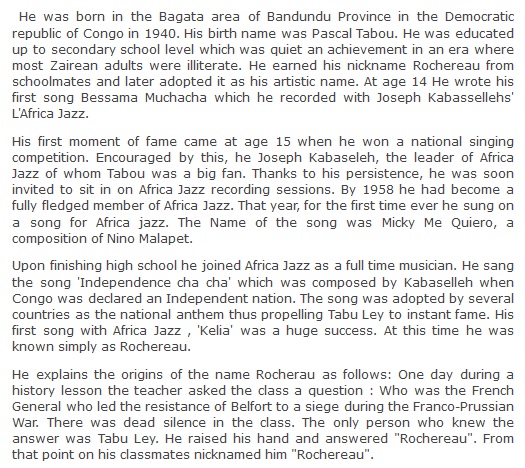
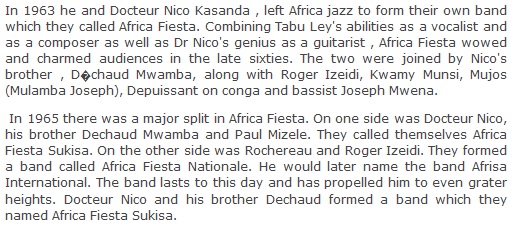
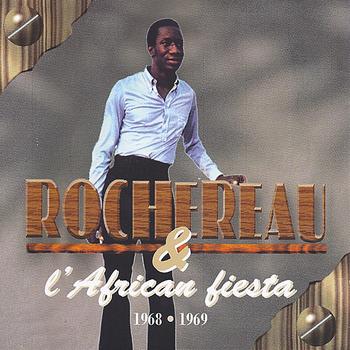
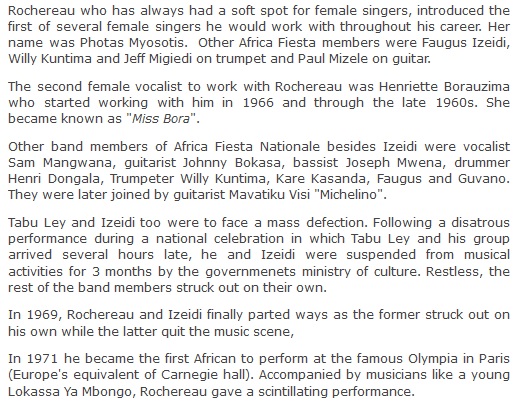
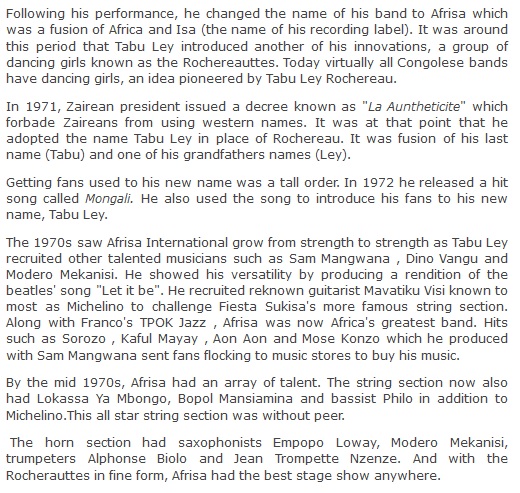
The material on this page is copyrighted .
Contact kenyapage for permission to copy
He was born in the Bagata area of Bandundu Province in the Democratic republic of Congo in 1940. His birth name was Pascal Tabou. He was educated up to secondary school level which was quiet an achievement in an era where most Zairean adults were illiterate. He earned his nickname Rochereau from schoolmates and later adopted it as his artistic name. At age 14 He wrote his first song Bessama Muchacha which he recorded with Joseph Kabassellehs' L'Africa Jazz.
His first moment of fame came at age 15 when he won a national singing competition. Encouraged by this, he Joseph Kabaseleh, the leader of Africa Jazz of whom Tabou was a big fan. Thanks to his persistence, he was soon invited to sit in on Africa Jazz recording sessions. By 1958 he had become a fully fledged member of Africa Jazz. That year, for the first time ever he sung on a song for Africa jazz. The Name of the song was Micky Me Quiero, a composition of Nino Malapet.
Upon finishing high school he joined Africa Jazz as a full time musician. He sang the song 'Independence cha cha' which was composed by Kabaselleh when Congo was declared an Independent nation. The song was adopted by several countries as the national anthem thus propelling Tabu Ley to instant fame. His first song with Africa Jazz , 'Kelia' was a huge success. At this time he was known simply as Rochereau.
He explains the origins of the name Rocherau as follows: One day during a history lesson the teacher asked the class a question : Who was the French General who led the resistance of Belfort to a siege during the Franco-Prussian War. There was dead silence in the class. The only person who knew the answer was Tabu Ley. He raised his hand and answered "Rochereau". From that point on his classmates nicknamed him "Rochereau".
In 1963 he and Docteur Nico Kasanda , left Africa jazz to form their own band which they called Africa Fiesta. Combining Tabu Ley's abilities as a vocalist and as a composer as well as Dr Nico's genius as a guitarist , Africa Fiesta wowed and charmed audiences in the late sixties. The two were joined by Nico's brother , D chaud Mwamba, along with Roger Izeidi, Kwamy Munsi, Mujos (Mulamba Joseph), Depuissant on conga and bassist Joseph Mwena.
In 1965 there was a major split in Africa Fiesta. On one side was Docteur Nico, his brother Dechaud Mwamba and Paul Mizele. They called themselves Africa Fiesta Sukisa. On the other side was Rochereau and Roger Izeidi. They formed a band called Africa Fiesta Nationale. He would later name the band Afrisa International. The band lasts to this day and has propelled him to even grater heights. Docteur Nico and his brother Dechaud formed a band which they named Africa Fiesta Sukisa.
Tabu Ley at Africa Fiesta National
Rochereau who has always had a soft spot for female singers, introduced the first of several female singers he would work with throughout his career. Her name was Photas Myosotis. Other Africa Fiesta members were Faugus Izeidi, Willy Kuntima and Jeff Migiedi on trumpet and Paul Mizele on guitar.
The second female vocalist to work with Rochereau was Henriette Borauzima who started working with him in 1966 and through the late 1960s. She became known as "Miss Bora".
Other band members of Africa Fiesta Nationale besides Izeidi were vocalist Sam Mangwana, guitarist Johnny Bokasa, bassist Joseph Mwena, drummer Henri Dongala, Trumpeter Willy Kuntima, Kare Kasanda, Faugus and Guvano. They were later joined by guitarist Mavatiku Visi "Michelino".
Tabu Ley and Izeidi too were to face a mass defection. Following a disatrous performance during a national celebration in which Tabu Ley and his group arrived several hours late, he and Izeidi were suspended from musical activities for 3 months by the governmenets ministry of culture. Restless, the rest of the band members struck out on their own.
In 1969, Rochereau and Izeidi finally parted ways as the former struck out on his own while the latter quit the music scene,
In 1971 he became the first African to perform at the famous Olympia in Paris (Europe's equivalent of Carnegie hall). Accompanied by musicians like a young Lokassa Ya Mbongo, Rochereau gave a scintillating performance.
Following his performance, he changed the name of his band to Afrisa which was a fusion of Africa and Isa (the name of his recording label). It was around this period that Tabu Ley introduced another of his innovations, a group of dancing girls known as the Rochereauttes. Today virtually all Congolese bands have dancing girls, an idea pioneered by Tabu Ley Rochereau.
In 1971, Zairean president issued a decree known as "La Auntheticite" which forbade Zaireans from using western names. It was at that point that he adopted the name Tabu Ley in place of Rochereau. It was fusion of his last name (Tabu) and one of his grandfathers names (Ley).
Getting fans used to his new name was a tall order. In 1972 he released a hit song called Mongali. He also used the song to introduce his fans to his new name, Tabu Ley.
The 1970s saw Afrisa International grow from strength to strength as Tabu Ley recruited other talented musicians such as Sam Mangwana , Dino Vangu and Modero Mekanisi. He showed his versatility by producing a rendition of the beatles' song "Let it be". He recruited reknown guitarist Mavatiku Visi known to most as Michelino to challenge Fiesta Sukisa's more famous string section. Along with Franco's TPOK Jazz , Afrisa was now Africa's greatest band. Hits such as Sorozo , Kaful Mayay , Aon Aon and Mose Konzo which he produced with Sam Mangwana sent fans flocking to music stores to buy his music.
By the mid 1970s, Afrisa had an array of talent. The string section now also had Lokassa Ya Mbongo, Bopol Mansiamina and bassist Philo in addition to Michelino.This all star string section was without peer.
The horn section had saxophonists Empopo Loway, Modero Mekanisi, trumpeters Alphonse Biolo and Jean Trompette Nzenze. And with the Rocherauttes in fine form, Afrisa had the best stage show anywhere.









